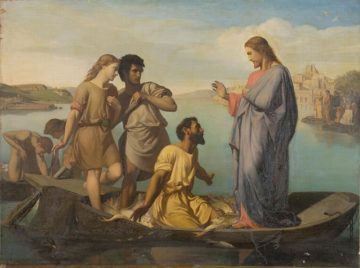Franciscan Friar Fr. Paul Gallagher reflects on the Gospel for the Fourteenth Sunday of Ordinary Time, July 3, 2022. The content is edited by Franciscan Sister of Christian Charity Sister Anne Marie Lom and Joe Thiel. The excerpts from the Sunday readings are prepared by Joe Thiel. To read or download the complete pdf with excerpts for your prayer, please click here: Franciscan Gospel Reflection July 3 2022. Excerpts are from the Lectionary for Mass for Use in the Dioceses of the United States of America, second typical edition © 2001, 1998, 1997, 1986, 1970 Confraternity of Christian Doctrine, Inc., Washington, DC. Used with permission. All rights reserved. No portion of this text may be reproduced by any means without permission in writing from the copyright owner. Photo: The Miraculous Draught, by Henri-Pierre Picou (1824-1895) [public domain / Wikimedia Commons]; 256px-Feet_on_the_ground.JPG (256×192) (wikimedia.org); [[File:Standing male feet.jpg|Standing male feet]]
 Luke 10:1-12, 17-20
Luke 10:1-12, 17-20
At that time the Lord appointed seventy-two others whom he sent ahead of him in pairs to every town and place he intended to visit. He said to them, “The harvest is abundant but the laborers are few; so ask the master of the harvest to send out laborers for his harvest. Go on your way; behold, I am sending you like lambs among wolves. Carry no moneybag, no sack, no sandals; and greet no one along the way. Into whatever house you enter, first say, ‘Peace to this household.’ If a peaceful person lives there, your peace will rest on him; but if not, it will return to you. Stay in the same house and eat and drink what is offered to you, for the laborer deserves his payment. Do not move about from one house to another. Whatever town you enter and they welcome you, eat what is set before you, cure the sick in it and say to them ‘The Kingdom of God is at hand.’ Whatever town you enter and they do not receive you, go out into the streets and say, ‘The dust of your town that clings to our feet, even that we shake off against you. Yet know this; the kingdom of God is at hand.’ I tell you, it will be more tolerable for Sodom on that day than for that town.”
The seventy-two returned rejoicing, and said, “Lord, even the demons are subject to us because of your name.” Jesus said, “I have observed Satan fall like lightning from the sky. Behold, I have given you the power to ‘tread upon serpents’ and scorpions and upon the full force of the enemy and nothing will harm you. Nevertheless, do not rejoice because the spirits are subject to you, but rejoice because your names are written in heaven.”
Background:
The gospel for last week began: “When the days for Jesus’ being taken up were fulfilled, he resolutely determined to journey to Jerusalem, and he sent messengers ahead of him (Luke 9:51).” That gospel focused first on the hostile reception Jesus received when he entered a Samaritan village, and the suggestion of James and John for violent retaliation. The second part of that text addressed those who would be followers of Jesus but felt they needed to delay becoming followers so that they could “bury the dead.”
This week’s text describes Jesus’ sending out his disciples. Matthew, Mark, and Luke all include an account of Jesus sending out the twelve disciples. Luke’s is the only gospel to include this account of Jesus sending out the 72 disciples. Seventy-two was believed to be the number of all the nations. It is also the number of elders Moses was instructed to choose from the people as they entered a covenant relationship with Yahweh (Exodus 24:1, Numbers 11:16). The number implies that the message from God is to go out to all the nations, not just to those towns that are on Jesus’ route to Jerusalem. This is another hint that the journey that Jesus and his disciples are taking to Jerusalem should be seen as a spiritual journey as well.
The sense of urgency that was part of last week’s gospel continues this week. There is also a quality of gentleness, for they are sent as “lambs among wolves,” and they are to travel very light, without sandals, money, or provisions, and they are not to greet anyone along the way. If they or their message are rejected, they are not to protest or give argument, but simply to move on. However, even if they are not welcomed, they are to announce publicly that the Kingdom of God is at hand.
Travel was already dangerous, and it was not the ordinary experience of people of the day. Also, there were those who would take advantage of travelers. The disciple who travels without money, staff, or sandals may have little of value to attract those with evil intentions, but they are also very vulnerable. The virtue of offering hospitality to strangers was extended only to men and foreigners. But there were always strings attached to accepting any favor, including hospitality. Jesus was asking a great deal of the disciples.
While Jesus’ disciples were dependent upon the generosity of strangers, they were not powerless. Ancient Mediterranean people believed in a hierarchy of power that extended from God through all of creation, and it included many spirits. It is clear from the description of the rejoicing seventy-two that Jesus has shared with them his power over the spirit world. For a human to have some power over spirits was not totally usual. The problem the leaders of the Jews had with Jesus was not that he cast out spirits, but that they did not know by what power he did such things. The followers are told to rejoice not in this unusual “overturning of the hierarchy of power,” but to rejoice instead that their names are written in heaven.
Reflection Questions:
- Do you consider yourself a light traveler?
- What exactly did you include in your last travel provisions?
- Can you imagine being among the 72 receiving Jesus’ instruction for your missionary journey? What thoughts and feelings are going through you?
- What would be the most difficult part of being asked to travel as a missionary for even a few weeks?
- What does the fact that seventy-two returned rejoicing say to you?
- What does Jesus’ response to their rejoicing say to you?
- Can you talk with God now about your experience of God sending you, how you see yourself as God’s disciple in your present life, or some hope you have or had in your life that does not seem to have come into being yet?



